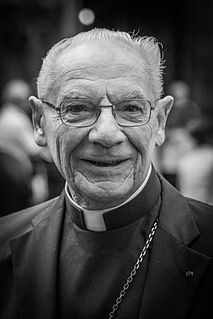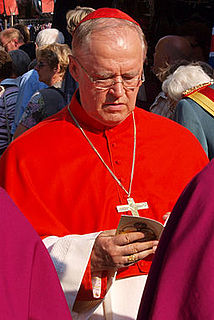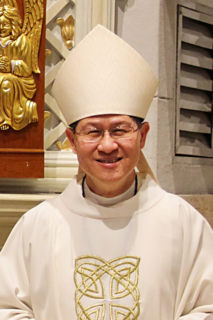The Roman Curia comprises the administrative institutions of the Holy See and the central body through which the affairs of the Catholic Church are conducted. The Roman Curia is the institution which the Roman Pontiff ordinarily makes use of in the exercise of his supreme pastoral office and universal mission in the world. It is at the service of the Pope, successor of Peter, and of the Bishops, successors of the Apostles, according to the modalities that are proper to the nature of each one, fulfilling their function with an evangelical spirit, working for the good and at the service of communion, unity and edification of the Universal Church and attending to the demands of the world in which the Church is called to fulfill her mission.

Crescenzio Sepe is an Italian prelate of the Catholic Church who served as Archbishop of Naples from 2006 to 2020. He served in the Roman Curia as Prefect of the Congregation for the Evangelization of Peoples from 2001 to 2006. He was made a cardinal in 2001. Before that he spent 25 years in increasingly important positions in the Roman Curia.
Stephen Fumio Hamao was a Japanese cardinal of the Roman Catholic Church and was the president of the Pontifical Council for the Pastoral Care of Migrants and Itinerants until it merged with other elements of the Roman Curia. He was made a cardinal by Pope John Paul II in 2003.

Ignatius Basile Moses I Daoud was Patriarch of Antioch for the Syrian Catholic Church, a Cardinal Bishop, and Prefect of the Congregation for the Oriental Churches in the Catholic Church.

Paul Joseph Jean Poupard is a French prelate of the Catholic Church who has been a Cardinal since 1985. He held positions in the Roman Curia for more than 25 years, serving as President of the Pontifical Council for Culture from 1988 to 2007 and briefly as President of the Pontifical Council for Interreligious Dialogue.

The Dicastery for the Clergy, formerly named Congregation for the Clergy, is the dicastery of the Roman Curia responsible for overseeing matters regarding priests and deacons not belonging to religious orders. The Congregation for the Clergy handles requests for dispensation from active priestly ministry, as well as the legislation governing presbyteral councils and other organisations of priests around the world. The Congregation does not deal with clerical sexual abuse cases, as those are handled exclusively by the Congregation for the Doctrine of the Faith.

The Dicastery for the Eastern Churches, previously named Congregation for the Oriental Churches or Congregation for the Eastern Churches, is a dicastery of the Roman Curia responsible for contact with the Eastern Catholic churches for the sake of assisting their development and protecting their rights. It also maintains whole and entire in the one Catholic Church, alongside the liturgical, disciplinary, and spiritual patrimony of the Latin Rite, the heritage and Eastern Catholic canon law of the various Eastern Catholic traditions. It has exclusive authority over the following regions: Egypt and the Sinai Peninsula, Eritrea and northern Ethiopia, southern Albania and Bulgaria, Cyprus, Greece, Iran, Iraq, Lebanon, Israel, Syria, Jordan and Turkey, and also oversees jurisdictions based in Romania, Southern Italy, Hungary, India and Ukraine.

Franc Rode is a Slovenian cardinal of the Roman Catholic Church. He is the prefect emeritus of the Congregation for Institutes of Consecrated Life and Societies of Apostolic Life, having served as prefect from 2004 to 2011. He was elevated to the cardinalate in 2006.

Duraisamy Simon Lourdusamy was an Indian cardinal of the Catholic Church. He was the Prefect of the Congregation for the Oriental Churches in the Roman Curia and was elevated to the cardinalate in 1985. His episcopical motto was Aedificare domum Dei which means "To build the house of God". He was the fourth cardinal from India and the first curial cardinal of Asia outside of the Middle East.
The Pontifical Council for the Pastoral Care of Health Care Workers was a pontifical council set up on 11 February 1985 by Pope John Paul II who reformed the Pontifical Commission for the Pastoral Assistance to Health Care Workers into its new form in 1988. It was part of the Roman Curia.
A pontifical council is a mid-sized department or dicastery of the Roman Curia, the central organization responsible for assisting the pope in the governance and oversight of Catholic Church. Such a council has a cardinal or archbishop as its president and is restricted in its activities in comparison with the larger parts of the Curia.
Pastor bonus is an apostolic constitution promulgated by Pope John Paul II on 28 June 1988. It instituted a number of reforms in the process of running the central government of the Catholic Church.

Paul Josef Cordes is a German cardinal of the Roman Catholic Church. He served as president of the Pontifical Council Cor Unum (1995–2010), and was elevated to the rank of cardinal in 2007.

Stanisław Marian Ryłko is a Polish Cardinal of the Roman Catholic Church. He held positions in the Roman Curia beginning in 1987 and was president of the Pontifical Council for the Laity from 2003 to 2016. He was made a cardinal in 2007. He has been Archpriest of the Basilica of Santa Maria Maggiore since 28 December 2016.

The history of the Roman Curia, the administrative apparatus responsible for managing the affairs of the Holy See and the Catholic Church, can be traced to the 11th century when informal methods of administration began to take on a more organized structure and eventual a bureaucratic form. The Curia has undergone a series of renewals and reforms, including a major overhaul following the loss of the Papal States, which fundamentally altered the range and nature of the Curia's responsibilities, removing many of an entirely secular nature.

Antonio Maria Vegliò is an Italian Cardinal of the Roman Catholic Church, who has served as Vatican diplomat and in the Roman Curia. He was President of the Pontifical Council for the Pastoral Care of Migrants and Itinerants. Vegliò was created a Cardinal by Pope Benedict XVI on 18 February 2012.

Luis Antonio Gokim Tagle is a Filipino prelate of the Catholic Church currently serving as the Pro-Prefect for the Section of Evangelization of Dicastery for Evangelization since June 5, 2022, and as the President of Interdicasterial Commission for Consecrated Religious since December 8, 2019. He was the 32nd Archbishop of Manila from 2011 to 2019. Tagle is the Cardinal-Bishop of San Felice da Cantalice a Centocelle and also serves as the President of Caritas Internationalis, President of the Catholic Biblical Federation, Grand Chancellor of the Pontifical Urbaniana University, and as a member of various departments and dicasteries in the Roman Curia.

Joseph Kalathiparambil is the Archbishop of the Roman Catholic Archdiocese of Verapoly. He was formerly the Secretary of the Pontifical Council for the Pastoral Care of Migrants and Itinerants. He also served as the Bishop of the Roman Catholic Diocese of Calicut for almost nine years.
The Dicastery for Promoting Integral Human Development is a dicastery of the Roman curia.
Praedicate evangelium is an apostolic constitution reforming the Roman Curia and was published and promulgated on 19 March 2022 by Pope Francis; the document took effect on 5 June 2022.













